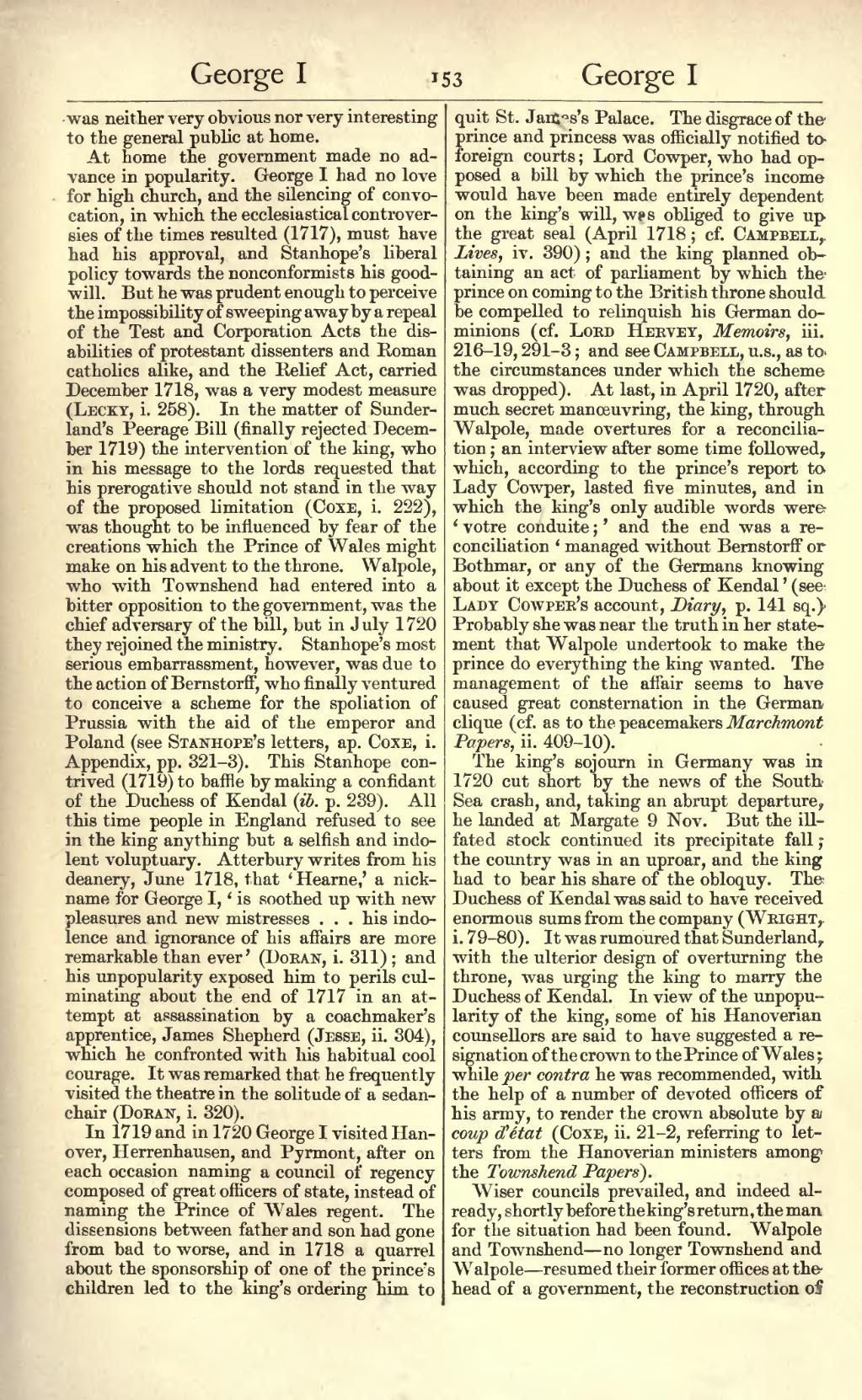was neither very obvious nor very interesting to the general public at home.
At home the government made no advance in popularity. George I had no love for high church, and the silencing of convocation, in which the ecclesiastical controversies of the times resulted (1717), must have had his approval, and Stanhope's liberal policy towards the nonconformists his good-will. But he was prudent enough to perceive the impossibility of sweeping away by a repeal of the Test and Corporation Acts the disabilities of protestant dissenters and Roman catholics alike, and the Relief Act, carried December 1718, was a very modest measure (Lecky, i. 258). In the matter of Sunderland's Peerage Bill (finally rejected December 1719) the intervention of the king, who in his message to the lords requested that his prerogative should not stand in the way of the proposed limitation (Coxe, i. 222), was thought to be influenced by fear of the creations which the Prince of Wales might make on his advent to the throne. Walpole, who with Townshend had entered into a bitter opposition to the government, was the chief adversary of the bill, but in July 1720 they rejoined the ministry. Stanhope's most serious embarrassment, however, was due to the action of Bernstorff, who finally ventured to conceive a scheme for the spoliation of Prussia with the aid of the emperor and Poland (see Stanhope's letters, ap. Coxe, i. Appendix, pp. 321-3). This Stanhope contrived (1719) to baffle by making a confidant of the Duchess of Kendal (ib. p. 239). All this time people in England refused to see in the king anything but a selfish and indolent voluptuary. Atterbury writes from his deanery, June 1718, that 'Hearne,' a nickname for George I, 'is soothed up with new pleasures and new mistresses . . . his indolence and ignorance of his affairs are more remarkable than ever' (Doran, i. 311); and his unpopularity exposed him to perils culminating about the end of 1717 in an attempt at assassination by a coachmaker's apprentice, James Shepherd (Jesse, ii. 304), which he confronted with his habitual cool courage. It was remarked that he frequently visited the theatre in the solitude of a sedan-chair (Doran, i. 320).
In 1719 and in 1720 George I visited Hanover, Herrenhausen, and Pyrmont, after on each occasion naming a council of regency composed of great officers of state, instead of naming the Prince of Wales regent. The dissensions between father and son had gone from bad to worse, and in 1718 a quarrel about the sponsorship of one of the prince's children led to the king's ordering him to quit St. James's Palace. The disgrace of the prince and princess was officially notified to foreign courts; Lord Cowper, who had opposed a bill by which the prince's income would have been made entirely dependent on the king's will, was obliged to give up the great seal (April 1718; cf. Campbell, Lives, iv. 390); and the king planned obtaining an act of parliament by which the prince on coming to the British throne should be compelled to relinquish his German dominions (cf. Lord Hervey, Memoirs, iii. 216-19, 291-3; and see Campbell, u.s., as to the circumstances under which the scheme was dropped). At last, in April 1720, after much secret manœuvring, the king, through Walpole, made overtures for a reconciliation; an interview after some time followed, which, according to the prince's report to Lady Cowper, lasted five minutes, and in which the king's only audible words were 'votre conduite;' and the end was a reconciliation 'managed without Bernstorff or Bothmar, or any of the Germans knowing about it except the Duchess of Kendal' (see Lady Cowper's account, Diary, p. 141 sq.) Probably she was near the truth in her statement that Walpole undertook to make the prince do everything the king wanted. The management of the affair seems to have caused great consternation in the German clique (cf. as to the peacemakers Marchmont Papers, ii. 409-10).
The king's sojourn in Germany was in 1720 cut short by the news of the South Sea crash, and, taking an abrupt departure he landed at Margate 9 Nov. But the ill-fated stock continued its precipitate fall; the country was in an uproar, and the king had to bear his share of the obloquy. The Duchess of Kendal was said to have received enormous sums from the company (Wright i. 79-80) . It was rumoured that Sunderland, with the ulterior design of overturning the throne, was urging the king to marry the Duchess of Kendal. In view of the unpopularity of the king, some of his Hanoverian counsellors are said to have suggested a resignation of the crown to the Prince of Wales; while per contra he was recommended, with the help of a number of devoted officers of his army, to render the crown absolute by a coup d'état (Coxe, ii. 21-2, referring to letters from the Hanoverian ministers among the Townshend Papers).
Wiser councils prevailed, and indeed already, shortly before the king's return, the man for the situation had been found. Walpole and Townshend—no longer Townshend and Walpole—resumed their former offices at the head of a government, the reconstruction of
